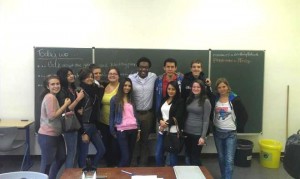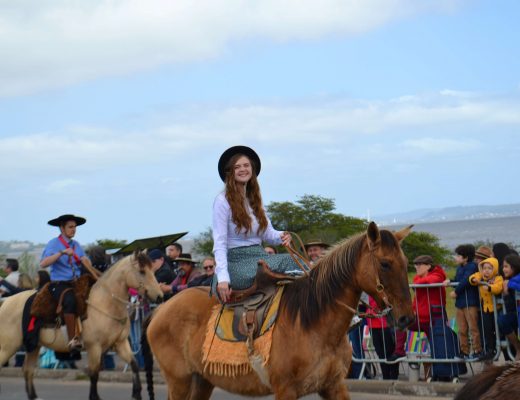
Deenaus Polk (center), 2011-2012, Fulbright English Teaching Assistant to Germany, with some of his students from Grade 11 Berufsfachschule Class I
Serving as a Fulbright English Teaching Assistant (ETA) in Germany provided many teachable moments. I approached my time as a Fulbright ETA with a specific goal in mind: I wanted to serve as a creative force, pushing my students to dream big and to elevate themselves towards heights they had never dreamed possible. As is usually the case with a bright-eyed, altruistic notion, I ran into a mighty brick wall – namely, the interest of my students.
My initial attempts at serving as a teaching assistant relied heavily on discussing the latest gossip on “important” topics such as Nicki Minaj, whether or not Tupac was still living, and if the Dallas Mavericks (Dirk Nowitzki is German!) could repeat as NBA Champions. Everything else fell on deaf ears. An eventual breakthrough came via an unexpected avenue – classical music. I have a huge love for classical music. Listening to it propels me through life, sparking all sorts of creative thought. Further, performing it with others is the ultimate form of diplomacy. For me, there’s nothing better than coming together with people you don’t know, especially in another country, and working together to understand, perfect, and perform a piece like Antonín Dvořák’s “Stabat Mater.” One day during class, I referenced Tom and Jerry and the prevalence of classical music within cartoons. I got nothing but blank stares in return. They had no clue what I was talking about! This sparked not only a slew of lessons, but also drastically altered my time as an ETA. I had the confidence needed to become the cool, ‘Mr. D.’ This allowed me to connect with students on a personal level. Several students attended my performances with a local choir. I also played semi-pro ‘American football’ with one of my students for a local team and would routinely tell our coach if he didn’t turn in his homework!
Within the community, I helped to create an after school program that brought students together to work on their homework and socialize with one another. I was also invited to appear on a local television show called “Agenda” as a political scientist to comment (in English) on global issues involving the Pope visiting Cuba, the Trayvon Martin tragedy, and the ascendancy of the BRIC countries. The most fulfilling Fulbright experience, however, was working with a local organization tutoring adult students. Through each of these activities, I challenged myself to step outside of my comfort zone and provide a perspective that encouraged dialogue and discussion.
My advice to students interested in applying for a Fulbright U.S. Student grant is to start your application EARLY. You’ll need time to form a coherent application package. Drafts should be numerous, emails to recommenders should be kind, and stress levels should be kept at a minimum. Also, make sure to convey who you are within your application. Fulbright wants to get to know the person behind the glorious GPA and stellar recommendations – put yourself out there! The magic of promoting mutual understanding and exchange will always occur as a result.
Finally, when applying, I believe that your foremost thought should be: How can I best encourage curiosity? You should think about this both literally in terms of your application’s readers, but also figuratively, in terms of the country where you want to assistant teach English or do research. This is invariably the catalyst that creates innovation and general good. As a Fulbright English Teaching Assistant or Fulbright U.S. Student Program Study/Research grantee, your mission is to push boundaries in order to stoke innovation and foster friendships. Will you accept? The world needs you!
Have questions for Deeneaus? He can be contacted as a Fulbright Alumni Ambassador at DPolk.AlumniAmbassador@fulbrightmail.org.


No Comments